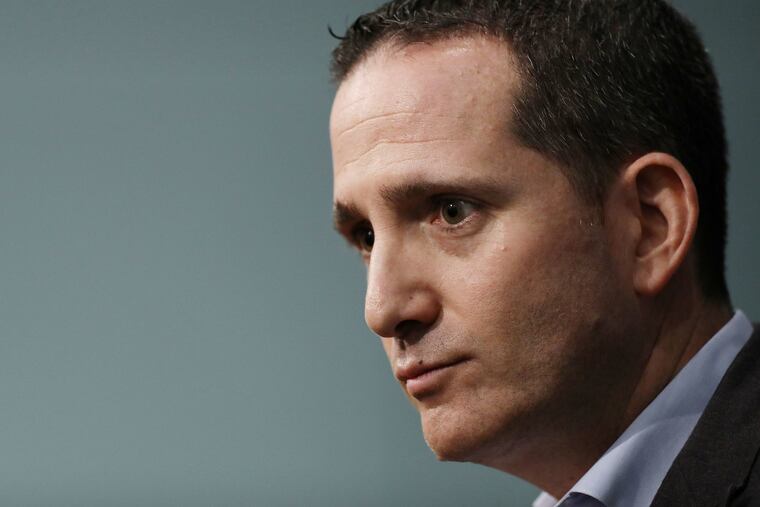Howie Roseman has spoken! Now let’s get to what matters: He’s the key to the Eagles’ offseason. | Mike Sielski
He laid out a sensible-if-vague plan: The team needs to get younger. The substance will say everything.

Every year around this time, after months of hiding himself from the prying eyes and ears of the public, a fellow peeks his head out, blinks against the light, and tells everyone what’s ahead for the rest of winter and the early weeks of spring.
So it was that Howie Roseman, the Eagles’ executive vice president of football operations, approached a lectern in the NovaCare Complex auditorium Wednesday morning, apologized for the 2019 season, and hinted at his plans to improve, or at least change, the Eagles for 2020.
“Going forward, we need to infuse youth in this team,” he said. “We have 10 draft picks. We think we're going to have 10 draft picks in this draft, and we're excited about that. When we look at what the young players did for our team down the stretch, it's a great tribute to them. It's a great tribute to our coaching staff, and it’s a great tribute to our developmental program that we take a lot of pride in.”
That’s a lot of tributes for a team that — while showing a fair amount of mettle in winning its final four games and, in turn, the NFC East — finished just 9-7 after entering the season with Super Bowl-sized hopes and expectations. This was the last of a four-year experiment/mission in which Roseman gave up draft picks to get Carson Wentz, then spent money and, in some cases, more draft picks to surround Wentz with experienced players so the Eagles might make an immediate run at a championship.
The experiment worked once, which is more often than any other experiment worked in the franchise’s 54 years of Super Bowl eligibility, but it failed this season, and even the scientist behind it had to acknowledge as much.
“When you have a disappointing season,” Roseman said, “it's not just on the players and the coaches. It's also on the front office. That starts with me, and I'm sorry to our fans.”
The next iteration of the Eagles’ roster starts with him, too, of course, and it was proper for him to put himself at the center of whatever change this offseason will bring. Doug Pederson has demonstrated pretty conclusively that he is a fine NFL coach, that his teams generally hit their stride when the games matter most, that he can be handed a collection of castoffs and practice-squad call-ups and still mold them into a playoff team. Wentz was as good over those final four regular-season games as he was during his MVP-level performance in 2017 and, in total, had an excellent season. That he was concussed on a borderline-dirty hit at the end of a low-risk scramble means the Eagles have to find a better option to back him up than a 40-year-old erstwhile TV analyst, but it doesn’t mean that he’s a problem to be corrected.
Roseman, then, doesn’t have to worry about the two most important aspects of any football team, head coach and quarterback, so he’s ahead of the game in that regard. But he still has work to do, and he left himself enough wiggle room in his remarks Wednesday for anyone to wonder just what shape that work will take.
He was right to say, for instance, that the Eagles need to get younger. That’s the proper diagnosis, but the cure involves more than just releasing or declining to re-sign several familiar veterans and drafting or signing a bunch of 21-to-26-year-olds. Not every Eagles player who has been around a while will leave, and not every first- or second-year guy or draft pick is or will ever be ready to replace those vets who do depart.
Consider just a few possibilities. J.J. Arcega-Whiteside will almost certainly be one of the wide receivers on the roster when training camp begins. Will that mean the Eagles think he’s ready to fill one of their two starting outside spots? Jason Peters will turn 38 in less than two weeks, and the Eagles already have his prospective successor at left tackle, Andre Dillard. Is it a fait accompli that they will say goodbye to Peters and turn the job over to Dillard? Did Dillard show them enough this season that they feel comfortable making that transition? And what if they’re wrong? Would it make sense to bring back Peters, as a starter/insurance policy, on another one-year deal? Malcolm Jenkins made it clear that he won’t play next season without a new contract. And while everyone can and should recognize his value to the franchise, on the field and off it, what if the Eagles determine there’s a younger, less-expensive option worth pursuing?
“I know, for me personally, one of my weaknesses is getting attached to our players,” Roseman said. “There's no doubt about it.”
The point isn’t that the Eagles shouldn’t keep Jenkins or should keep Peters or should give up on Arcega-Whiteside. The point is that no one yet knows the tangible meaning and effect of the broad strokes that Roseman laid out Wednesday, not even Roseman himself.
You can try to interpret his murk-speak, and you can try to read as many tea leaves as you like. It’s a fun exercise, but it doesn’t amount to much. Don’t listen to what he says. Watch what he does in the months ahead.